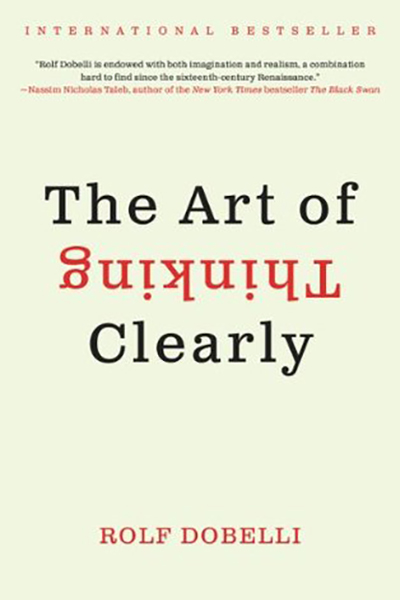Rolf Dobelli’s “The Art of Thinking Clearly” is a compelling exploration of the cognitive biases and logical fallacies that often cloud our decision-making processes. With a keen eye for human behavior and a knack for simplifying complex psychological concepts, Dobelli provides readers with a roadmap to navigate the murky waters of their own minds.
The book is structured into 99 succinct chapters, each dedicated to unraveling a specific mental pitfall or cognitive blind spot. Dobelli employs a straightforward and accessible writing style, making the content approachable for readers of all backgrounds. From the Confirmation Bias to the Sunk Cost Fallacy, Dobelli delves into the various traps that can compromise the clarity of our thinking.
One of the book’s strengths lies in Dobelli’s ability to illustrate each concept with real-world examples, anecdotes, and historical events. These relatable stories not only make the content more engaging but also underscore the universality of these cognitive errors. Readers will find themselves nodding in recognition as they recognize instances of flawed thinking in their own lives.
“The Art of Thinking Clearly” is not merely a catalogue of cognitive biases; it serves as a practical guide to sharpening one’s mental acuity. Dobelli not only highlights the pitfalls but also suggests strategies to mitigate their impact. Whether it’s the dangers of over-optimism, the perils of groupthink, or the illusion of control, the author provides actionable insights that readers can apply to enhance their decision-making abilities.
Moreover, Dobelli’s emphasis on self-awareness and continuous improvement adds a layer of personal development to the book. By encouraging readers to recognize and confront their cognitive blind spots, he empowers them to make better decisions and lead more fulfilling lives.
While some critics might argue that the book oversimplifies certain psychological concepts, it’s precisely this simplicity that makes the content accessible to a broader audience. Dobelli strikes a balance between academic rigor and readability, making the book a valuable resource for both casual readers and those with a more scholarly interest in behavioural economics.
In conclusion, “The Art of Thinking Clearly” stands out as a masterpiece in the realm of cognitive science literature. Rolf Dobelli’s ability to distill complex ideas into digestible nuggets of wisdom makes this book a must-read for anyone seeking to understand and improve their thought processes. Whether you’re a seasoned scholar in behavioural economics or a curious reader with a penchant for self-improvement, Dobelli’s work will leave a lasting impact on the way you perceive and navigate the world.

